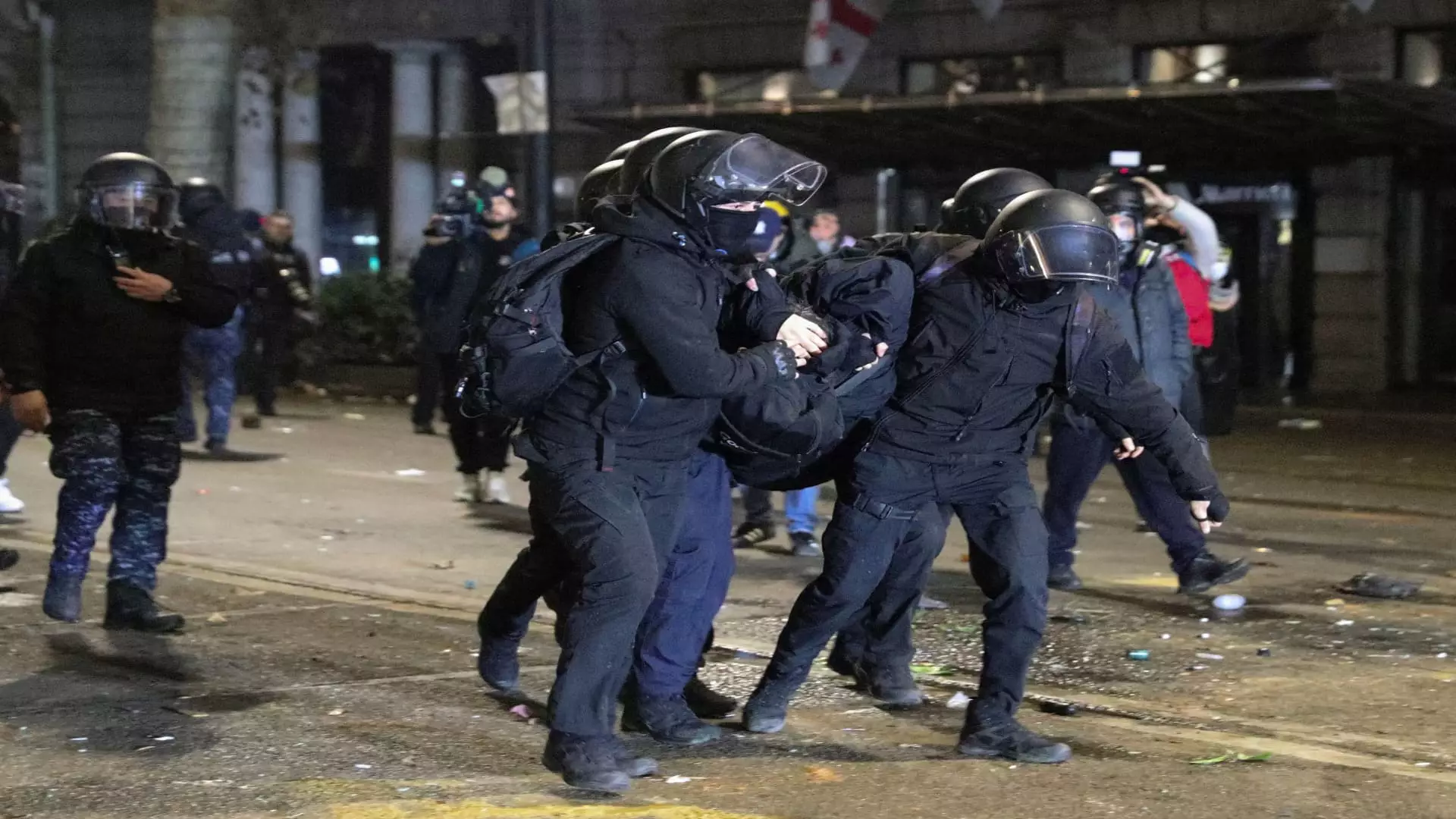Georgia finds itself at a crossroads filled with uncertainty and unrest as citizens rally against governmental decisions perceived as detrimental to the country’s European integration ambitions. The capital, Tbilisi, has witnessed a series of escalating protests, particularly after the Georgian government announced a suspension of negotiations to join the European Union. This announcement ignited a firestorm of discontent among thousands of demonstrators, culminating in confrontations that left dozens injured and a nation on edge.
The protests are a powerful showcase of the populace’s frustration, as tens of thousands took to the streets, demonstrating their dissatisfaction with the government’s direction. Violence erupted, with demonstrators throwing stones and igniting fireworks. A significant display of rage came in the form of setting ablaze an effigy of Bidzina Ivanishvili, the founding figure of the ruling Georgian Dream party. Such actions depict a broader sentiment of anger towards political leadership that many view as corrupt and disconnected from the aspirations of the Georgian people.
In response to the spiraling unrest, the Georgian government, led by Prime Minister Irakli Kobakhidze, has taken a firm stance against any form of disorder. Kobakhidze’s remarks underscored a no-tolerance policy towards law violations, with warnings that both protestors and those who incite violence would face severe consequences. This authoritative response reflects a prevailing attitude among ruling elites who seem intent on maintaining power, even amidst widespread calls for democratic reform and accountability.
The Prime Minister’s contention that Georgia’s European integration is not halted starkly contrasts with the sentiments echoed by protestors and criticism from international partners. While Kobakhidze labeled accusations surrounding the country’s EU aspirations as “shameful and offensive blackmail,” concerns linger over the glaring disconnect between government proclamations and grassroots reality. The governmental reassurance that discussions with European authorities would continue under a new administration raises alarms about the stability of these relations and the future trajectory of Georgia’s political landscape.
Internationally, Georgia’s decision to suspend integration talks has raised red flags among key allies, particularly in Europe and the United States. The European Parliament’s recent criticism of Georgia’s electoral integrity underscores the broader disillusionment regarding the prospects of democratic governance in the country. The statements from EU officials respond to an urgent need for Georgia to adhere to democratic norms, urging the ruling party to respect the rights to peaceful assembly and free expression—a vital cornerstone of any functioning democracy.
The shift in Georgia’s international relations, particularly following the passage of controversial legislation perceived as a threat to democratic freedoms, compels a reassessment of the nation’s foreign policy and its alignment with Western values. The growing perception that political machinations are increasingly influenced by external powers, particularly Russia, reignites historical fears of falling under Moscow’s sway. As highlighted by Georgia’s pro-Western President Salome Zourabichvili, the reality of the country potentially morphing into a “quasi-Russian” state raises questions about sovereignty and autonomy in the face of broad geopolitical pressures.
In light of these significant challenges, the opposition parties have located their efforts in the demand for new elections that would reflect the will of the people, free from alleged governmental interference or misconduct. As protests continue, the clarity of these demands is palpable: a united call for transparency, fair representation, and a return to the essential democratic values Georgia embraced during its post-Soviet reforms.
The path forward for Georgia remains fraught with complexity, as its leaders grapple with the expectations of its citizens while navigating the rocky terrain of international diplomacy and internal strife. Achieving a genuine commitment to democratic principles and a steadfast approach toward integration into European structures will require not only political will but also a concerted effort from civil society to hold their leaders accountable. The next steps taken by the government will not only define the immediate future but also shape the long-term trajectory of this resilient nation striving for a secure and prosperous future within the European community.

Leave a Reply